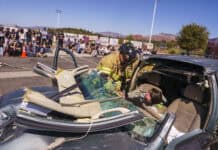
Cornville-based artist Michael O’Neal — known locally as “Dig” — of Sacred Fire Woodburned Guitars went from selling his art as a teenager at Grateful Dead shows in the late 1980s to having his work featured by the band’s successor Dead & Company on their final tour, which ended on July 16 at Oracle Park in San Francisco.
The band raised $450,000 raised from auctioning seven guitars Dig decorated with Grateful Dead designs for the voter drive HeadCount, which partners with musicians to encourage voter registration, as well as the environmental organization Reverb and other Dead related charities.
Since the band’s formation in 2015, it has raised over $13 million for nonprofits and social causes.
“I did seven guitars for [Dead & Company], and four of them were autographed by the entire band,” Dig said. “That includes Bob Weir, Mickey Hart from the original Grateful Dead and then John Mayer, who’s filling in for Jerry Garcia’s lead guitar. That’s what brought in the money for the guitars, the fact that they were signed. [But] it was a great honor for me, because it felt like I was part of rock ’n’ roll history, having these guitars signed and going to collectors and they’re museum pieces now.”
Dig’s work with Dead & Company made its debut earlier this year at the band’s “Playing in the Sand” event in Mexico after HeadCount representatives came across his work online.
“We fell in love with the Sacred Fire arts style right away, and thought it would be a perfect fit for Dead and Co’s,” HeadCount’s major gifts director Kristina Raines said. “These guitars had such a warm reception by fans in Mexico, we asked Dig to additionally create a simpler design for fundraising specifically for the final tour. In 2023, [Dig] helped us raise a total of $450,000 with seven beautiful works of art and we are forever grateful.”
The experience has brought Dig back to the start of his artistic career, when he first started seeing Grateful Dead Shows in 1989.
“I was 18 [when] I finally made it to a Dead show in Illinois where I was living,” Dig said. “Then it clicked and I was like, ‘Wow, I’m home. I want to create art based on this experience.’ Within a year, I had started using the talent that I had developed of screen printing. I had been drawing for years and used that to create Grateful Dead-inspired designs on shirts that I would sell on Shakedown Street … It’s an iconic term for the vending scene that happens outside of a jam band show.”
Dig used the proceeds from Tshirt and jewelry sales to follow the Dead on tour until he parlayed that trade into a job with a screen printing company in the Virgin Islands, where he worked for six years. Eventually, he moved on to a 20-year career as a tattoo artist doing custom work.
“I had a high level of success with tattooing,” Dig said. “I had people who had traveled from all over the globe to see me in Sedona. Everything I did was custom for that person. I wasn’t working a whole lot [of examples such as] the designs on the wall. I got a lot of experience creating designs that emulated the person’s personal story, represented the person in a deep and meaningful way, or also honored important moments or transitions in that person’s life such as the deaths, or births.”
About six years ago, Dig decided to transition from telling stories on flesh to using those same skills to allow people to tell their stories on instruments by decorating guitars using woodburning.

“It’s not a forgiving art medium,” Dig said. “But 20 years of tattooing has conditioned me to not have room for mistakes. Woodburning a guitar is a bit more forgiving than tattooing, because in the worst case you can sand off. If I misspelled something that was not supposed to be there, I could sand it away, but that’s not how I approach it. I don’t have room for error. Because if I sand, it affects the level of the thickness of the guitar in that spot, it might not be perfectly level and I am a perfectionist.”

Music informs Dig’s creative process as he draws from a number of styles in order to capture what he feels is the essence of a given performer in a visual form.
“My goal is that I’m creating something deeply meaningful for individuals,” Dig said. “I’ve done a number of guitars that honor people that have passed away for their children. I’ve even done guitars that incorporate the ashes of people who have passed away.”


















